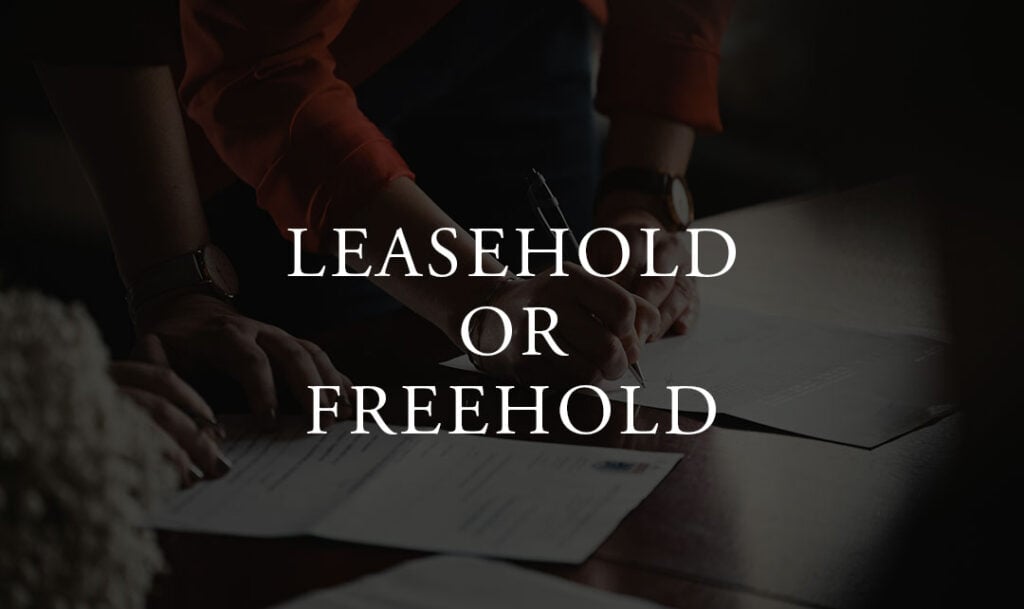

Since 2010, the Global Law Experts annual awards have been celebrating excellence, innovation and performance across the legal communities from around the world.
posted 4 months ago
The UAE has become one of the most active real estate markets in the region, drawing buyers from across the world. For those looking to purchase, the rules of ownership are defined by two structures, freehold and leasehold. The difference is whether ownership extends to the land itself or is limited to long-term rights of use. This distinction shapes how property can be sold, passed on, or held as an investment
This article outlines how the system works across the Emirates and what investors and residents need to weigh when considering property purchase.
Freehold ownership gives the buyer complete control of a property and the land it sits on. The title is recorded in their name, which means they can sell, lease, or pass it on through inheritance without restriction. For many, this permanence makes freehold the most attractive option when settling long-term or planning for future generations.
In Dubai, designated districts have been opened to foreign buyers since 2002, creating a well-established freehold market. While the city has defined zones where non-Emiratis may purchase, the range covers many of the most popular residential and mixed-use communities. Abu Dhabi introduced a similar model in 2019, allowing expatriates to own freehold units in specific investment zones. That reform removed earlier limits that restricted most overseas buyers to leasehold rights and brought the capital closer in line with Dubai’s system.
These rules give international families and investors security that is often absent in other regional markets. A freehold title allows them to treat property as a long-term asset, either as a home base or as part of a wider portfolio. Because ownership is indefinite, it appeals to buyers who want stability, clear succession planning, and the option of resale without additional approvals.
Leasehold ownership runs on fixed terms, usually between 30 and 99 years, with the option to renew. Buyers can live in the property, rent it out, or sell the remaining lease period, but the land itself always stays with the original owner.
In practice this is often the route into central towers or large mixed-use projects where developers keep hold of the site. It’s a familiar model for apartments, where control of the land is less important than access to the unit itself.
Renewal clauses aren’t standardised, so the price or conditions for extending a lease can vary widely. Resale values also track the time left on the clock, which means shorter leases can narrow the pool of interested buyers. For anyone looking at leasehold, the contract is as important as the unit, and timing becomes part of the calculation.
This model gives flexibility for those who want access to areas that would otherwise be closed off, while keeping the long view tied to the lease term rather than indefinite ownership.
The difference between the two models really comes down to time. Freehold has no limit, so it can stay in a family for generations. Leasehold runs on a set term, which means the resale value shifts with the years left on the contract. A unit with 80 years remaining carries a very different weight in the market than one with only 15.
That plays out in how people plan. Freehold gives the comfort of permanence and makes succession straightforward, since the title itself passes on. Leasehold needs more thought about timing and renewal, and buyers tend to factor in where they are in the cycle before committing.
The paperwork reflects this. Freehold titles are logged with the Dubai Land Department in Dubai or the Municipality in Abu Dhabi and show clear ownership of both land and building. Leasehold is also registered, but the entry records rights of use rather than full control.
For many, the choice is practical. Freehold suits those looking for long-term security or something to hand down. Leasehold can be a way into prime areas at a lower cost, or for those who see their horizon in years rather than decades.
Succession adds another layer. Property in the UAE falls under local inheritance rules unless a DIFC or Abu Dhabi Judicial Department will has been put in place. For expats this distinction is crucial, since the default framework may distribute assets in ways that do not reflect personal wishes.
Freehold passes through family succession in much the same way as property elsewhere, while leasehold rights can also be inherited if the term and contract allow it. These details are easy to miss at the buying stage, yet they carry weight years down the line.
Advisers who work across borders play a role here, bringing wills and structuring into the picture to ensure ownership plans tie in with broader estate goals. That kind of guidance links the purchase to family security, which is often the deeper reason behind the investment in the first place.
Stay informed with the latest legal developments at Global Law Experts
Author


No results available
posted 12 hours ago
posted 1 day ago
posted 1 day ago
posted 1 day ago
posted 1 day ago
posted 1 day ago
No results available
Find the right Legal Expert for your business
Global Law Experts is dedicated to providing exceptional legal services to clients around the world. With a vast network of highly skilled and experienced lawyers, we are committed to delivering innovative and tailored solutions to meet the diverse needs of our clients in various jurisdictions.

Thinking of buying property in Brazil? Start with a full legal safety net.
✔️ Check title and ownership history
✔️ Verify no debts or disputes
✔️ Confirm zoning and permits.
#BrazilProperty #RealEstateInvesting #LegalDueDiligence #ForeignInvestment #PropertyLaw #GlobalRealEstate #InvestmentRisk #BrazilLaw

When your international business faces financial distress, quick action is key! 🔑 Negotiating with creditors, restructuring debt, and understanding insolvency laws can help regain stability. Global Law Experts is here to guide you through your options.
🌍Explore the details on our website.
🔗Link in bio
#GlobalLawExperts #CommercialLaw #BusinessLaw #LegalAdvice #BusinessGrowth #LegalTips #BusinessStrategy #LegalCompliance #Law #LegalKnowledge #LegalAwareness #Law101 #LegalEducation #IntellectualProperty

Thinking of buying property in Brazil? Don’t stop at the contract or key handover. Make sure the title is officially registered before calling it yours.
#BrazilRealEstate #PropertyLaw #GlobalInvestment #ForeignInvestors #LegalTips #DueDiligence #RealEstateRegistration #SecureInvestment

Getting a termination notice right now? Know your rights. Valid reason, fair process, proper notice they matter. Don’t let a bad dismissal walk away without accountability.
#EmploymentLaw #WorkerRights #Termination #LaborLaw #FairDismissal #WorkplaceJustice #LegalAwareness #GlobalWorkforce

Running a business is hard enough — lawsuits shouldn’t make it harder. 🚫 Protect your business with the right legal strategies and expert tools from Global Law Experts. Let’s secure your future together! 💼
🌍Explore the details on our website.
➡️www.globallawexperts.com
#GlobalLawExperts #CommercialLaw #BusinessLaw #LegalAdvice #BusinessGrowth #LegalTips #BusinessStrategy #LegalCompliance #Law #LegalKnowledge #LegalAwareness #Law101 #LegalEducation #IntellectualProperty #Infringed #Ecommerce #LegalBranding
Global Law Experts is dedicated to providing exceptional legal services to clients around the world. With a vast network of highly skilled and experienced lawyers, we are committed to delivering innovative and tailored solutions to meet the diverse needs of our clients in various jurisdictions.

Thinking of buying property in Brazil? Start with a full legal safety net.
✔️ Check title and ownership history
✔️ Verify no debts or disputes
✔️ Confirm zoning and permits.
#BrazilProperty #RealEstateInvesting #LegalDueDiligence #ForeignInvestment #PropertyLaw #GlobalRealEstate #InvestmentRisk #BrazilLaw

When your international business faces financial distress, quick action is key! 🔑 Negotiating with creditors, restructuring debt, and understanding insolvency laws can help regain stability. Global Law Experts is here to guide you through your options.
🌍Explore the details on our website.
🔗Link in bio
#GlobalLawExperts #CommercialLaw #BusinessLaw #LegalAdvice #BusinessGrowth #LegalTips #BusinessStrategy #LegalCompliance #Law #LegalKnowledge #LegalAwareness #Law101 #LegalEducation #IntellectualProperty

Thinking of buying property in Brazil? Don’t stop at the contract or key handover. Make sure the title is officially registered before calling it yours.
#BrazilRealEstate #PropertyLaw #GlobalInvestment #ForeignInvestors #LegalTips #DueDiligence #RealEstateRegistration #SecureInvestment

Getting a termination notice right now? Know your rights. Valid reason, fair process, proper notice they matter. Don’t let a bad dismissal walk away without accountability.
#EmploymentLaw #WorkerRights #Termination #LaborLaw #FairDismissal #WorkplaceJustice #LegalAwareness #GlobalWorkforce

Running a business is hard enough — lawsuits shouldn’t make it harder. 🚫 Protect your business with the right legal strategies and expert tools from Global Law Experts. Let’s secure your future together! 💼
🌍Explore the details on our website.
➡️www.globallawexperts.com
#GlobalLawExperts #CommercialLaw #BusinessLaw #LegalAdvice #BusinessGrowth #LegalTips #BusinessStrategy #LegalCompliance #Law #LegalKnowledge #LegalAwareness #Law101 #LegalEducation #IntellectualProperty #Infringed #Ecommerce #LegalBranding
Send welcome message